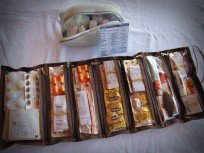This topic is super important if you want to do this kind of trip. You won’t want to jeopardise your experience over something silly, so be prepared!
Here we put all important tips related to health. And attention, for some vaccines, like hepatitis A and B, you need to start the process 6 months before your trip.
Travel insurance
Do not even think about leaving without first hiring a travel insurance! It is the sort of thing you pay to not use, but the day you need it you will appreciate it. You never know what can happen and if something happens it will be much more expensive to pay out of your own pocket. There is a website that compares the costs and policies from several different companies and you can buy it there: Square Mouth.
Vaccine
| Vaccines | Treatments | Indications |
|---|---|---|
| Yellow fever | 1 dose, valid for 10 years | This is really the only vaccine required by various countries. Check the list in this link. |
| Hepatite A | 2 doses in a period of 6 months, valid for 10 years | Recommended in developing countries with poor hygiene conditions, because disease transmission can occur through ingestion of contaminated food and water. |
| Hepatite B | 3 doses over a period of 6 months, for life | High risk - Southeast Asia, China, Pacific Islands, Africa south of Sahara and Alaska. Medium risk –Mediterranean basin, Eastern Europe, Central Asia, Japan, Latin America and the Middle East. |
| Rage | 3 doses over a period of one month, valid for 5 years | Rage is transmitted by infected animals. A dog bite could transmit the disease. So if you have contact with animals or make a more adventurous itinerary is recommended. |
| Diphtheria + Tetanus | 3 doses over a period of up to 8 months, valid for 10 years | The risk of acquiring tetanus exists in many country in the world, so it is always recommended. |
| typhoid | 1 dose, valid for 3 years | Recommended for developing countries with poor hygiene conditions. High-risk areas: India, Southeast Asia, Africa, Central America and South America |
| Japanese Encephalitis | 3 doses, and the latter must be made 10 days before departure, valid for 2 years | High risk only when the stay is longer than 30 days and disease transmission is seasonal. From May to September in China, Korea, Japan and eastern Russia and after the rainy season in Southeast Asia and India. |
| Malaria | There is no vaccine, only medication to prevent it | Disease transmission occurs in more than 100 countries. Check the list in this link. |
| Flu | 1 dose, valid for 1 year. | Needless to mention that the flu vaccine is always recommended. |
Water and food consumption
Here are some tips for you to keep your health up during the trip:
- Avoid ice;
- Avoid natural fruit juices, because they are mixed with water;
- Eat only washed fruits;
- Avoid raw vegetables;
- Avoid creams, sweets, chopped meat, but enjoy boiled milk and yogurts;
- Don’t forget to always wash your hands before you eat. You can use a concentrated hand sanitizer;
- Never drink water from unknown sources and when you buy natural water check if the cover is locked;
- Prefer sparkling water consumption as it is harder to fake.
Generally, most problems and infections are caused by bad water quality. Therefore, stay alert regarding the water you are consuming and remember that many dishes are cooked with tap water. With these precaution you can avoid many issues.
Medications
Some health problems are more common than others and can be easily treated with the use of regular medication. So, consult your doctor and take with you some medication you are used to for problems like:
- Headaches
- The Flu
- Fevers
- Muscle aches
- Allergies
- Burns
- Hangovers
- Nausea
- Constipation
- Diarrhea
- Stomach aches
- Soothing
- Skin lesions
- Eye drops
- General pains
- Cystitis
IMPORTANT: you need to bring all your prescriptions for medication with you because you could face problems with the immigration departments in some countries. Moreover, to make your life easier when you are in pain, the ideal thing to do is list or stick a ‘usage indication’ on all your medication so you don’t waste time looking for what you need.
You should also prepare a first-aid kit with basic items such as: a thermometer, gauzes, scissors, band-aids, disinfectants, etc. And don’t forget to take sun block. You will be in the sun for many hours and you should use it daily.

